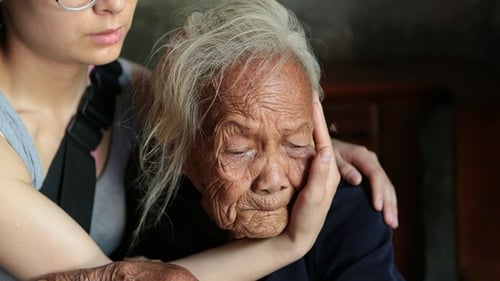
Editor
중국 지역 일본군 ‘위안부’ 피해자 20만 명 2014년 촬영 당시 생존자 단 22명 그 22명의 할머니들이 들려주는 마지막 이야기 그리고… 2018년 8월 현재 중국에 남아 있는 ‘위안부’ 피해자는 단 6명 할머니들 대부분은 90세를 넘겨 삶의 끝자락에 서 있다.

Producer
중국 지역 일본군 ‘위안부’ 피해자 20만 명 2014년 촬영 당시 생존자 단 22명 그 22명의 할머니들이 들려주는 마지막 이야기 그리고… 2018년 8월 현재 중국에 남아 있는 ‘위안부’ 피해자는 단 6명 할머니들 대부분은 90세를 넘겨 삶의 끝자락에 서 있다.

Director
중국 지역 일본군 ‘위안부’ 피해자 20만 명 2014년 촬영 당시 생존자 단 22명 그 22명의 할머니들이 들려주는 마지막 이야기 그리고… 2018년 8월 현재 중국에 남아 있는 ‘위안부’ 피해자는 단 6명 할머니들 대부분은 90세를 넘겨 삶의 끝자락에 서 있다.

Director of Photography
Ai Weiwei’s Appeal ¥15,220,910.50 opens with Ai Weiwei’s mother at the Venice Biennial in the summer of 2013 examining Ai’s large S.A.C.R.E.D. installation portraying his 81 day imprisonment. The documentary goes onto chronologically reconstruct the events that occurred from the time he was arrested at the Beijing airport in April 2011 to his final court appeal in September 2012. The film portrays the day-to-day activity surrounding Ai Weiwei, his family and his associates ranging from consistent visits by the authorities, interviews with reporters, support and donations from fans, and court dates. The Film premiered at the International Film Festival Rotterdam on January 23, 2014.

Writer
December 1944, 24-year-old Wei Shaolan and her 1-year-old daughter were seized and sent to a Japanese camp, where Wei was forced to work as a 'comfort woman' -- a woman forced into prostitution for Japanese servicemen during World War II. Despite being physically and mentally abused, Wei unbelievably escaped the heavily guarded 'Comfort Station' pregnant, shamed, and unsure of what fate awaited her return home. This documentary presents the true legendary story of Wei Shaolan and follows her traumatic and courageous journey from forced prostitution to life today with her Japanese son. 'Real Heroes' are people who can face life bravely even after a tormented life, and Wei's story offers inspiration to those faced with seemingly hopeless adversity.

Director
December 1944, 24-year-old Wei Shaolan and her 1-year-old daughter were seized and sent to a Japanese camp, where Wei was forced to work as a 'comfort woman' -- a woman forced into prostitution for Japanese servicemen during World War II. Despite being physically and mentally abused, Wei unbelievably escaped the heavily guarded 'Comfort Station' pregnant, shamed, and unsure of what fate awaited her return home. This documentary presents the true legendary story of Wei Shaolan and follows her traumatic and courageous journey from forced prostitution to life today with her Japanese son. 'Real Heroes' are people who can face life bravely even after a tormented life, and Wei's story offers inspiration to those faced with seemingly hopeless adversity.

Cinematography
A short documentary about the making of "Straight" and "Forge" (2008-2012).

Cinematography
Early in 2008, the district government of Jiading, Shanghai invited Ai Weiwei to build a studio in Malu Township, as a part of the local government's efforts in developing its cultural assets. By August 2010, the Ai Weiwei Shanghai Studio completed all of its construction work. In October 2010, the Shanghai government declared the Ai Weiwei Shanghai Studio an illegal construction, and was subjected to demolition.

Cinematography
As a sequel to Ai Weiwei’s film "Disturbing the Peace," the film "So Sorry" (named after the artist’s 2009 exhibition in Munich, Germany) shows the beginnings of the tension between Ai Weiwei and the Chinese Government. In "So Sorry," you see the investigation led by Ai Weiwei studio to identify the students who died during the Sichuan earthquake as a result of corruption and poor building constructions leading to the confrontation between Ai Weiwei and the Chengdu police. After being beaten by the police, Ai Weiwei traveled to Munich, Germany to prepare his exhibition at the museum, Haus der Kunst. The result of his beating led to intense headaches caused by a brain hemorrhage and was treated by emergency surgery. These events mark the beginning of Ai Weiwei’s struggle and surveillance at the hands of the state police.

Producer
The documentary depicts a complete picture of a chain in the cat-trading industry. Since the end of 2009 when the government began soliciting expert opinion for the Animal Protection Act, the focus of public debate has always been on whether one should be eating cats or not, or whether cat-eating is a Chinese tradition or not, there are even people who would go as far as to say that the call to stop eating cat meat is "imposing the will of the minority on the majority". Yet the "majority" does not understand the complete truth of cat-meat trading chains: cat theft, cat trafficking, killing cats, selling cats, and eating cats.








